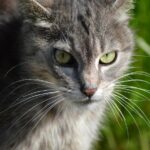As your feline companion reaches their golden years, it’s crucial to tailor their diet to meet their evolving needs. Aging cats often require different nutritional support compared to their younger counterparts. In this comprehensive guide, we’ll explore the best senior cat foods available on the market, their nutritional benefits, common dietary concerns for aging cats, and tips on choosing the right food for your furry friend.
Understanding the Nutritional Needs of Senior Cats
Senior cats, generally aged 7 years and older, face unique dietary requirements. Their metabolism slows down, and they may experience health issues such as dental problems, reduced activity, arthritis, and kidney disease.
Key Nutritional Components for Senior Cats:
High-Quality Protein: Aging cats need a diet rich in high-quality proteins to maintain muscle mass and support overall health. Protein should come primarily from animal sources, such as chicken, turkey, and fish.
Reduced Caloric Intake: Senior cats are often less active, which means they require fewer calories. Overfeeding can lead to obesity, which can exacerbate health problems.
Increased Fiber: Soluble and insoluble fiber aids in digestion and helps prevent constipation, a common issue for older cats.
Omega Fatty Acids: Omega-3 and Omega-6 fatty acids can improve joint health and enhance the coat’s condition. These essential fats also have anti-inflammatory properties that can benefit aging joints.
Vitamins and Minerals: Essential vitamins (e.g., Vitamin E, B vitamins) and minerals (e.g., magnesium, calcium) are key for maintaining health and supporting immune function.
Hydration: Senior cats are prone to dehydration, especially if they develop kidney issues. Foods with higher moisture content or added water can help keep them hydrated.
Antioxidants: Antioxidants help combat oxidative stress and reduce inflammation, which is beneficial for overall health in aging cats.
Common Health Concerns in Senior Cats
Before diving into the best senior cat foods, it’s essential to be aware of the common health issues that may arise as cats age:
Kidney Disease: As cats age, their kidneys may become less efficient. Low-protein diets are sometimes recommended, although high-quality protein is essential for muscle maintenance.
Dental Health Issues: Many senior cats suffer from dental problems, making soft or wet food a better choice.
Obesity: Reduced activity can lead to weight gain, which can worsen joint problems and lead to diabetes.
Arthritis: Joint pain is common in older cats; therefore, foods with joint-supporting nutrients are beneficial.
Hyperthyroidism: This is a common disorder in older cats, leading to increased metabolism and often requiring dietary adjustments.
Top Senior Cat Food Brands and Products
Choosing the right food for your senior cat means navigating a plethora of options. Below are some of the best cat food brands that cater specifically to the needs of aging felines:
1. Hill’s Science Diet Senior Cat Food
Type: Dry and Wet Food Options
Key Ingredients: Chicken, brown rice, and barley.
Benefits: Hill’s Science Diet includes high-quality protein and L-carnitine to help maintain a healthy weight. The formula also has omega-6 fatty acids for skin and coat health and essential vitamins to support overall well-being.
2. Royal Canin Aging 12+
Type: Dry Food
Key Ingredients: Chicken meal, rice, corn, and animal fat.
Benefits: Specifically designed for cats aged 12 and older, it contains a blend of antioxidants and a tailored phosphorus level to support kidney health. Its balanced nutrients also promote healthy aging.
3. Purina Pro Plan Senior Cat Food
Type: Dry and Wet Food Options
Key Ingredients: Salmon, chicken, and rice.
Benefits: Features nutrient-dense ingredients with a specific focus on nutrient absorption. The formula also contains high-quality protein for maintaining muscle mass and omega fatty acids for skin and coat health.
4. Blue Buffalo Wilderness Senior Cat Food
Type: Dry Food
Key Ingredients: Deboned chicken, chicken meal, and sweet potatoes.
Benefits: Grain-free with high protein content, this formula includes LifeSource Bits—antioxidant-rich pieces aimed at supporting immune health and life balance. Ideal for active senior cats.
5. Nutro Ultra Grain-Free Senior Cat Food
Type: Dry Food
Key Ingredients: Chicken, lamb, and salmon.
Benefits: This grain-free formula offers a blend of proteins and omega fatty acids, promoting a healthy metabolism and maintaining muscle mass. It’s also rich in antioxidants for overall health.
6. Wellness CORE Grain-Free Senior Cat Food
Type: Dry Food
Key Ingredients: Turkey, chicken, and fish meal.
Benefits: High-protein, grain-free food that provides balanced nutrition for aging cats. It’s formulated to support lean body mass and a healthy weight, containing probiotics for digestive health.
7. Merrick Purrfect Bistro Senior Cat Food
Type: Wet Food
Key Ingredients: Chicken, turkey, and salmon.
Benefits: A high-protein wet food rich in moisture, ideal for hydration. It has no artificial colors, flavors, or preservatives, ensuring a wholesome diet for your senior cat.
8. Iams ProActive Health Mature Cat Food
Type: Dry Food
Key Ingredients: Chicken, corn, and sorghum.
Benefits: This formula contains a balanced ratio of fiber for digestive health and prebiotics for gut health. It’s designed for senior cats to maintain ideal body weight and optimal digestion.
9. Tiki Cat Prowl Grain-Free Wet Cat Food
Type: Wet Food
Key Ingredients: Tuna and chicken.
Benefits: High in protein and moisture, this formula mimics a natural feline diet. It’s free from grains and carbohydrates, focusing instead on protein to help maintain muscle mass.
10. Natural Balance L.I.D. Green Pea & Chicken Formula
Type: Dry and Wet Food Options
Key Ingredients: Green peas and chicken.
Benefits: Designed for cats with food sensitivities, this limited-ingredient diet is easy on the digestive system and helps maintain a healthy weight in senior cats.
How to Choose the Right Senior Cat Food
To find the best food for your senior cat, consider these important factors:
1. Consult Your Veterinarian
Before making any dietary changes, it’s crucial to consult your veterinarian. They can recommend specific brands and formulas based on your cat’s health and any specific needs they may have.
2. Read Labels Carefully
Look for foods specifically labeled for “senior” or “mature” cats. Check the ingredient list, focusing on high-quality protein sources, healthy fats, and the absence of fillers or artificial additives.
3. Monitor Your Cat’s Weight
Pay attention to your cat’s weight and adjust their food intake accordingly. You may need to switch to a formula designed for weight management if your cat is overweight.
4. Look for Ingredients that Promote Joint and Digestive Health
Consider foods that contain glucosamine, chondroitin, and omega-3 fatty acids to support joint health, as well as probiotics and fiber for digestive health.
5. Consider Food Texture
Some aging cats may experience dental issues, making it difficult for them to chew hard kibble. In such cases, wet food or kibble formulated for easy chewing may be a better option.
6. Pay Attention to Lifestage Changes
As your cat continues to age, their dietary needs may change. Regularly assess their health status and adjust their food accordingly.
7. Gradual Transition Process
When switching cat foods, do so gradually over a week to minimize digestive upset. Start by mixing small amounts of the new food with the old and gradually increase the new food’s proportion.
Conclusion
Feeding a senior cat is about more than just providing sustenance; it’s about keeping them healthy, comfortable, and happy as they navigate their twilight years. By choosing the right food that meets their specific nutritional needs, you can enhance their quality of life and help them age gracefully.
Always remember that every cat is unique, and their individual health conditions should guide your choices. A thorough discussion with your veterinarian will provide you with tailored recommendations, ensuring that your feline friend receives the best possible care as they age. With the right approach to nutrition, your senior cat can enjoy their golden years with vitality and joy.
Additional Resources
- The Association of American Feed Control Officials (AAFCO): This organization sets nutritional standards for pet foods.
- American Association of Feline Practitioners (AAFP): Offers guidelines on cat health and nutrition.
- Pet Food Institute: Provides resources and information about different types of pet foods.
By understanding the specific needs of aging cats and carefully selecting the best senior cat foods, you can ensure your beloved pet continues to thrive in the later stages of life.
Featured Image Credit: Pixabay


